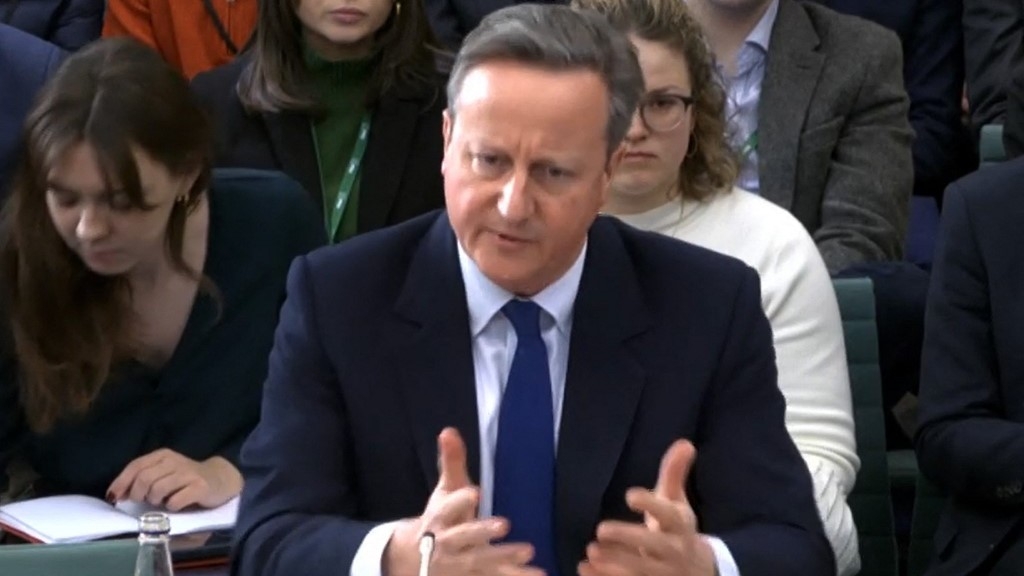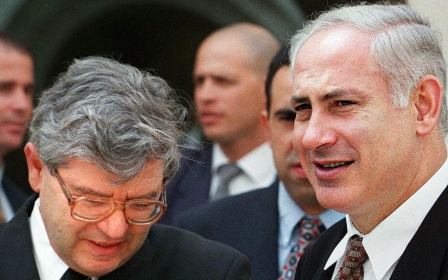War on Gaza: Cameron 'worried' Israel may have breached international law

UK Foreign Secretary Lord Cameron is “worried” Israel may have breached international law in Gaza, but told MPs that government lawyers had not explicitly advised him of this.
"Am I worried that Israel has taken action that might be in breach of international law because this particular premises has been bombed?" Cameron said.
"Yes, of course I’m worried about that and that’s why I consult the Foreign Office lawyers when giving this advice on arms exports."
Cameron made the comments on Tuesday during his first appearance before the Foreign Affairs Committee since his November appointment, and as Israel's offensive on Gaza, which has seen over 23,200 killed, neared its 100th day.
The question of whether government lawyers advised Cameron of an Israeli breach of international law is relevant to a High Court challenge the UK government faces over its continued licensing of arms exports to Israel.
New MEE newsletter: Jerusalem Dispatch
Sign up to get the latest insights and analysis on Israel-Palestine, alongside Turkey Unpacked and other MEE newsletters
The legal and human rights organisations who filed the challenge last month say there is mounting evidence of Israeli violations of international law in its ongoing offensive in Gaza and that UK arms exports to Israel should therefore have been suspended.
Under its arms exporting criteria, the government is obligated to suspend such licences if it determines that there is a clear risk that British weapons might be used in violation of international law.
During Tuesday's hearing, Conservative MP and committee chair Alicia Kearns and Scottish National Party MP Brendan O'Hara pushed Cameron to clarify what legal advice he had received.
Kearns asked, in particular, why the government, under Cameron's leadership as prime minister, called for a review of UK arms exports to Israel during its 2014 offensive on Gaza, which the UN says saw 2,251 Palestinians killed, but not the most recent one.
Cameron said UK arms exports to Israel were "permanently reviewed" with the grant of licences made by the Department of Business and Trade, on the advice of the Foreign Office, which assessed Israel's compliance with international humanitarian law.
Further pushed by Kearns, he said: "The circumstances are different because of October the 7th being such a hostile attack on Israel and the government's position that Israel has a right to defend itself and the right to try to stop Hamas from launching future terrorist attacks."
She responded: "I just find it strange that when there were much lower levels of hostilities and activity, you put in place one as prime minister and this time around, despite the circumstances being so much more serious, there hasn’t been a review."
"I think I've answered the question," Cameron said.
Turning water back on in Gaza
O'Hara asked Cameron repeatedly whether he had seen any evidence or had any ground to believe Israel was in breach of international humanitarian law.
Cameron responded several times, explaining that he wasn't a lawyer and had regularly sought legal advice. O'Hara then pointed out that earlier in the hearing, Cameron had said the UK government wanted Israel to turn the water back on in northern Gaza.
"I’m asking you, in your position as foreign secretary, if Israel has the power to turn the water back that they turned off, surely that is a flagrant breach of international humanitarian law," O'Hara said.
Cameron again said he wasn't a lawyer, but that Israel "ought to switch it on because in the north of Gaza, the conflict is now effectively over there".
"So getting more water and power into northern Gaza would be a very good thing to do," he said. "You don't have to be a lawyer to make a judgement about that. You just have to be a human being."
Pushed several more times about whether he has been advised that Israel had breached international law, Cameron said: "The short answer to that is no."
He added, however, that he felt his answer wasn't "fair on the lawyers" because it didn't reflect the complexity of their considerations.
"The lawyers give you lots of advice saying, 'We are worried about this event, that event. We're going to go away. We're going to consult with Israeli authorities, ask a bunch of questions and then we are going to give you considered legal advice'," Cameron said.
"That's why it's not really a yes or no answer," he said to O'Hara. "I'm trying to be helpful by explaining how the job works. Does that help at all?"
"No," said O'Hara to some laughter from those gathered in the small room at Portcullis House. "But unfortunately, I think it's as good as I'm going to get from you."
Middle East Eye delivers independent and unrivalled coverage and analysis of the Middle East, North Africa and beyond. To learn more about republishing this content and the associated fees, please fill out this form. More about MEE can be found here.





